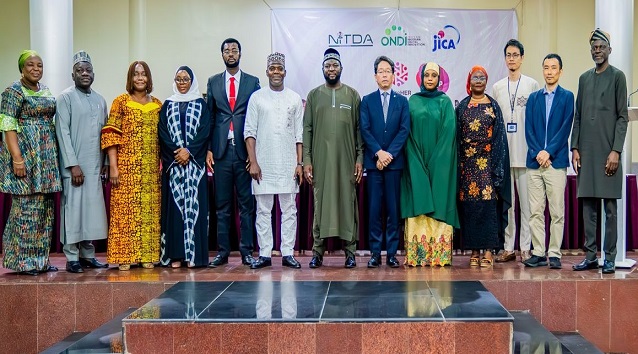General News
Airlines Rake in N304Bn from Tickets Sales in 2013

Both the foreign and domestic airlines with flying routes in Nigeria, in 2013, sold tickets worth N304 billion. And while the domestic airlines sold tickets worth N73 billion, on the other hand, the foreign airlines sold tickets worth 231 billion in the same year.
The domestic airlines were able to ferry 5 million passengers across Nigeria in 2013.
Capt. Usman Mukhtar, director general, Nigerian Civil Aviation Authority (NCAA) disclosed these while delivering a keynote address at the 20th Annual League Of Airport And Aviation Correspondents (LAAC) seminar in Lagos.
On the West Coast route, he said, 277,000 passengers were moved. In Intra – African route 437,000 passengers and on the Intercontinental route 1.4 million passengers were airlifted.
“All these were achieved with the domestic airlines operating a total of 63,000 frequencies across the country. On the West Coast there were 4000 frequencies, Intra – Africa 4000, Intercontinental 7300 frequencies.
He said that in recognition of the increase in the volume of passengers, the Directorate of Consumer Protection (DCP) has intensified efforts to process complaints and ensure comfort of air travellers.
According to him, Nigeria has therefore become an attractive destination for foreign airlines and ceaseless application for additional frequencies.
“At present Nigeria has Bilateral Air Services Agreement (BASA) with 78 countries. However, some of these are not being utilised. In order to strengthen and widen our BASA with existing and new countries, Nigerian delegates will be attending an ICAO Air Services Negotiation Conference (ICAN 2014) from 17th – 21st November 2014 at Bali, Indonesia.
“As in the past, the ICAN Conference will provide States with a central meeting place to conduct multiple bilateral (regional or plurilateral) air services negotiations or consultations. It will offer participants excellent networking opportunities.
You can now agree with me that the Nigerian Civil Aviation Authority through its robust regulation has been able to drive aviation to a very high pedestal of “development. The traffic will definitely continue to increase.
Earlier, he noted that in terms of policy thrust, especially from the regulatory perspective it is within NCAA’s framework to propound policy guidelines to drive aviation activities in Nigeria. All these policies fall under our instruments of regulation.
Nigeria is a member of the International Civil Aviation Organisation (ICAO) and therefore a substantial part of our regulatory instruments and policies are derivable for ICAO Annexes and documents.
In addition to these, the Nigerian Civil Aviation Regulations (NCARs), other legislations and conventions in line with the standard and recommended practices are used to provide regulation in the industry.
Enforcement and Sanctions are definitive recourse when there is a violation.
With these capacities, the DG said that NCAA has over the years been able to acquaint itself creditably with effective and efficient regulation of the aviation industry. A major testimony is the attainment and retention of FAA IASA Cat 1.
“In the ICAO Audit conducted in a few years back, Nigeria scored very high marks. There is an impending ICAO Audit again and I am sure no one is losing sleep over that as the Authority has proven to be equal to the task.
“The global average of compliance to ICAO Safety Oversight Audit is 60 per cent. All members have subsequently agreed that all African states should strive to attain 60 per cent by the year 2017.Let me just intimate you with the strategic objectives of the imminent ICAO audit.
“This is to achieve excellence in Safety, Air Navigation Capacity and efficiency, Security and Facilitation, Economic Development of Air Transportation and Environmental Protection. However, the date is yet to be communicated to us.
“NCAA has continuously strengthened its regulations by periodical review and training of personnel. This is why our staff can comfortably excel anywhere in the world. We have Certified ICAO Inspectors in our ranks. We have been able to restore confidence in the air transport operations despite occasional mishaps,” he said.
According to the International Airlines Transport Association (IATA), in the last few years Africa has contributed over 7 per cent to the world traffic. In Nigeria, almost all major cities have been interconnected by air link.
NCAA has recently given Operational Permits to Bernin Kebbi, Jigawa (Dutse) and Bauchi International Airports. These airports were able to airlift pilgrims for Hajj this year.
Mukhtar said, “It is instructive to note that due to the upsurge in number of passengers in Nigeria, NCAA has keyed into a new ICAO methodology designed to accommodate the increase in traffic worldwide. This led to the formation of Aviation Safety Block Upgrade (ASBU) Committee in Nigeria.
“The Regulatory Authority has evaluated and granted approval for Airports Security Program (ASP) at majority of the airports. Others are undergoing assessment for approval. This is expedient in the face of global security challenges”.
He also urged aviation stakeholders in the country to continue to partner with the Authority for greater efficiency.
General News
NITDA Deepens Digital Gender Inclusion with IgniteHer Bootcamp

In a powerful demonstration of its commitment to the Renewed Hope Agenda of the present administration of President Bola Ahmed Tinubu GCFR, the National Information Technology Development Agency (NITDA) has launched the second cohort of the IgniteHer Bootcamp for Women Entrepreneurs, a strategic initiative aimed at accelerating gender inclusion and economic empowerment through digital innovation.

The bootcamp, themed “Empowering Women Entrepreneurs for Growth and Innovation”, was launched in partnership with the Japan International Cooperation Agency (JICA) and brought together selected women entrepreneurs from across Nigeria, both physically and virtually, for rigorous training in digital skills, innovation management, business development, and investor readiness.
The NITDA Director General, Kashifu Inuwa CCIE, who declared the bootcamp open, reaffirmed the Agency’s role in aligning Nigeria’s digital development with the national priorities of reforming the economy for sustained inclusive growth and accelerating economic diversification through industrialisation and digitisation.
“Through IgniteHer, we are actualising President Bola Ahmed Tinubu’s Renewed Hope Agenda by expanding women’s access to technology and economic opportunity,” he stated.
The DG, who was represented by the agency’s Acting Director of the Digital Literacy and Capacity Building department, Dr. Ahmed Tambuwal, noted that inclusive innovation is a cornerstone of NITDA’s Strategic Roadmap and Action Plan (SRAP 2.0: 2024–2027), which supports national aspirations for inclusive growth, poverty eradication, and youth empowerment.
“We are not merely imparting skills; we are creating self-reliant entrepreneurs, change-makers, and leaders,” he added.
Inuwa disclosed that the IgniteHer Bootcamp is also a key component of the National Gender Digital Inclusion Strategy (NGDIS), through which NITDA is working to empower 12.7 million Nigerian women with digital literacy skills by 2027. He averred that the programme complements broader government efforts to bridge gender gaps, enhance productivity, and reduce unemployment, especially among young women.
Citing a report by the World Wide Web Foundation, the DG emphasised that closing the digital gender gap in Nigeria could unlock an estimated $13 billion in GDP growth over the next decade.
“This training is a step towards harnessing this economic potential and ensuring that women play an integral role in shaping the digital landscape of Nigeria,” he noted.
He therefore called on participants selected from over 12,000 applicants to seize the moment and shape the future of Nigerian entrepreneurship.
While highlighting NITDA’s leadership in strategic partnerships, the DG commended JICA and the Government of Japan for their ongoing collaboration in supporting digital empowerment through programmes like IgniteHer and the iHatch Incubation Programme, which provides startup support, mentorship, and innovation development to early-stage entrepreneurs.
“At NITDA, we believe that inclusive innovation is not just an ideal but a critical strategy that ensures the growth of a stronger economy, the development of smarter solutions, and the existence of more resilient communities. Through IgniteHer, we are dismantling barriers and replacing them with pathways to opportunity,” he concluded.
In his remarks, the Japanese Ambassador to Nigeria, Matsunaga Kazuyoshi, reaffirmed Japan’s long-standing commitment to innovation and gender inclusion in Nigeria. He announced that Japan, through JICA, is currently supporting two grant projects worth $30.9 million, focused on improving Nigeria’s startup ecosystem, strengthening the investment climate, and building an inclusive innovation hub.
The Ambassador also referenced the upcoming Tokyo International Conference on African Development (TICAD 9), themed “Co-create Innovative Solutions with Africa”, as further testament to Japan’s dedication to deepening Africa-Japan cooperation on digital transformation and entrepreneurship.
Lead Facilitator of IgniteHer, Hajiya Hafsat Salabi-Dange, described the programme as a catalyst for social and economic transformation. While praising NITDA’s visionary approach to development, she stated that the programme is a movement that is bridging the digital gender divide and fostering economic independence.
Encouraging the participants to remain curious, intentional, and bold, she said, “What you will gain here goes beyond business; it is a tool for community upliftment, national growth, and generational impact.”
General News
NAF, NIGCOMSAT to Boost Nigeria’s Security with Satellite Technology

Nigerian Air Force (NAF) and Nigerian Communications Satellite (NIGCOMSAT) Limited have entered into a strategic alliance aimed at advancing operational effectiveness, sovereignty, and sustainability through space-based innovations.

This was during a courtesy visit by Jane Egerton-Idehen, managing director and chief executive officer of NIGCOMSAT, to Air Marshal Hasan Bala Abubakar, chief of the Air Staff (CAS), at the NAF Headquarters in Abuja on Wednesday, August 7, 2025.
According to Air Commodore Ehimen Ejodame, director of Public Relations and Information, Headquarters, Nigerian Air Force, discussions during the meeting focused on leveraging NIGCOMSAT’s satellite capabilities to enhance the NAF’s mission-critical functions, particularly in the areas of secure communication, real-time intelligence, surveillance, and reconnaissance.
Both parties acknowledged that the future of national defence lies in digital dominance and home-grown technological solutions.
Abubakar stressed the urgent need for indigenous systems to support the evolving demands of modern air operations.
“We must continually seek innovative ways to improve our capabilities and reduce reliance on foreign systems.
Strategic collaboration with institutions like NIGCOMSAT is essential to ensure secure communication and real-time situational awareness across our theatres of operation,” the CAS said.
In her remarks, Egerton-Idehen praised the Air Force’s proactive approach and expressed NIGCOMSAT’s readiness to support the military with tailored satellite solutions that align with national security objectives.
“This partnership is not only timely but critical in strengthening Nigeria’s digital defence infrastructure.
NIGCOMSAT stands ready to deploy its expertise in support of the Nigerian Air Force and contribute meaningfully to national security,” she said.
Both organisations reaffirmed their shared commitment to advancing Nigeria’s security architecture through the use of indigenous space technologies.
General News
FG Announces New Fossil Fuel Tax

Federal government has announced it will impose a new 5 percent refined fossil fuel tax from January.

The surcharge, which has been signed into law by President Bola Tinubu to encourage clean energy use, could raise more than half a billion dollars annually.
The fee will apply to petrol and diesel, while cooking gas and compressed natural gas — which the government has tried to promote — are exempted.
Nonprofit group ActionAid Nigeria said the policy will “disproportionately impact the poor” and deepen inequality, noting that Nigerians have not recovered from the inflationary effect of the removal of fuel subsidies in 2023.

 E-Financial1 day ago
E-Financial1 day agoZenith Bank Slammed with ₦85m Fine for Freezing Account on Invalid Court Order

 Telecom2 days ago
Telecom2 days agoAirtel Nigeria CEO Identifies Data Boom, Nationwide Connectivity as Crucial Innovation Areas

 Telecom2 days ago
Telecom2 days agoNCC Tightens Rules of Corporate Governance for Telcos

 Telecom1 day ago
Telecom1 day agoTelcos Say Mobile, Internet Services in Nigeria may Collapse

 E-Business1 day ago
E-Business1 day agoHow to Avoid NIN Portal Lockout under New Restrictions — NIMC

 Broadcasting2 days ago
Broadcasting2 days agoMastercard Highlights Africa’s $16.5Bn AI Potential and Path to Digital Empowerment

 News2 days ago
News2 days agoOlukoyede, EFCC Chair Denies Forcing Ojulari to Resign as NNPC Boss

 E-Financial2 days ago
E-Financial2 days agoZenith Bank rolls out drums for D’Tigress, rewards team with N200m



























